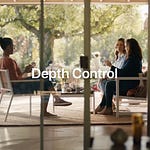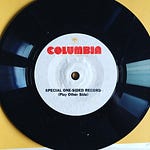Note: I’m traveling this week, so I’m revisiting a previous entry, with a new audio component. This piece landed before I had as many readers, or any listeners, so it should be new to many of you. And please comment if you experience the same trick with your memory that I describe in the post.
Also, if you have read this already and don’t want to listen or comment, then why not take the few minutes you’ve saved and recommend this newsletter to a friend?
One day when I was seven, my brothers and I were tossing around a Nerf football in the backyard. I caught a spiral, turned, and sprinted for an imaginary touchdown. As I ran, my point of view and my perception of time changed. I was looking down at the scene from a nearby hilltop. I saw myself running too far ahead of the others to be caught. My bright windbreaker stood out against the dark grass in the shade of nearby trees. I saw the sky above the trees, too. Everything was in slow motion. The instrumental ring of the guitar and organ from the chorus of "Born to be Wild" played over the scene. It looked like a movie, though definitely a cliched one.
Describing it, I realize this sounds like I had some kind of psychological break or out-of-body experience. But I don't think it's anything so severe. I loved TV and movies and I had surely heard an adult describe something as being "just like a movie." The football memory sticks in my head not because it's the first time I thought that about my own life, but because I don't have any recollection of thinking that phrase at all. It was an automatic and instant switch in perspective with a spot-on needle drop.
Over the next few years, I had more experiences where my mind shifted to a movie mode. Walking home around dusk, I would see myself from behind, silhouetted by the red setting sun. I imagined credits rolling by when a teacher ended class with a witty remark. Sometimes my internal monologue sounded like Daniel Stern's narration in The Wonder Years. At least once, I fantasized about turning to an imaginary fourth wall and saying "here we go again."
To be clear, I knew that I wasn't being filmed, that I wasn't living in a fictitious world, and that I wasn't talking to an audience. Back then, just like now, I didn't have the confidence to imagine I was a character in any sort of narrative, let alone the main character. I just liked thinking about how movies and TV were made. My imagination was clearly influenced by the films and shows I loved.
Last month, I realized my memories are, too.
Linda and I were watching Paris, Texas. Wim Wenders's masterpiece came out before I was born, but it looks like my memories of childhood (only in appearance; my life was nothing like the movie). There are some physical similarities. The cars, clothes, and homes of the early '80s look more like the cars, clothes, and homes of my childhood '90s. But it wasn't the objects I focused on. The look of the film stock—the way it captured the light, the distance created by the lens—is the way my memories look.
I thought about this more when we watched Speed a couple weeks later. It's not nearly as beautiful as Paris, Texas, but it is, similarly, a movie shot on film in the late 20th century. My memory has Kodak hues.
I can't find any research on this phenomenon in the library. That makes sense, given that it's pretty much an unprovable concept. No one else can see my memories, and to even use the word "see" for visualizing a memory might be a stretch. But what I did find in my search for an explanation was scientific research into the "time cells" that exist in the brain and help us sequence events in our memories. NPR has a nice summary. In addition to ordering memories, this research says, our brains compress and stretch time. In a way, we’re automatically editing the raw footage of experience into movies of memories. It made me wonder if my experience with the football really happened live, or if I've just remembered it in this edited way.
The research doesn't tell me why my memory movies look like actual movies—movies that were shot using the technology of the time. The answer to this, I believe, is in the question itself. Technology.
Some of my memories are based on experience—these are things I remember happening. There are some significant events, but also a lot of random occurrences that have never left my mind. (Of all the ice cream I ate from the Dairy Queen near my grandparents' house, why I do remember only one particular butterscotch-dipped cone?) Other memories are mediated through some kind of technology—usually a photograph. It's rare that I will see a photo from childhood and remember what I was doing the moment it was taken. Instead, I remember the era. I see a photo from 1992 and I remember my second-grade classroom, the treehouse in our yard, the way I would kick gravel while waiting for the bus stop.
The photos are hard evidence. The feelings they bring back are textural. That texture transfers to the memories. To me, the '90s look like they were shot on film because that's the way I've seen that era documented. High school and beyond looks like a crisp JPEG. I can't say I look at these photos much, though. They're in albums at my parents' house or on hard drives that probably don't work anymore. My main experience of the past is through experiential memories I hold on to, reshaped to look like photos I once saw.
The photos I do have are more recent—they were taken in the years of ever-present smartphone cameras and instant cloud syncing. Every day, my phone lights up with an offer to look at these old photos. It shows me what I documented on this date at various years in the past. There's always a lot to see, but it's never much to look at. Most of my camera roll is made up of screenshots—paragraphs of articles I liked, funny headlines, typos, other people's embarrassing tweets. None of these are what I would ever save in a photo album. I barely needed to save them at the time.
My phone calls these flashback slideshows memories, but that's romanticizing things. Really, they're just files.
When my phone does serve me a real photo from a memorable occasion, there's usually just one. That's because I long ago stopped using my phone during such moments. I want to experience things as they are, without the possibility I'll get sucked into reading emails or immediately telling the world about the moment I would otherwise be living through.
I remember a lot of these experiences very clearly. But what do those memories look like? I can't really say.
What do your memories look like? Share in the comments.
















Share this post